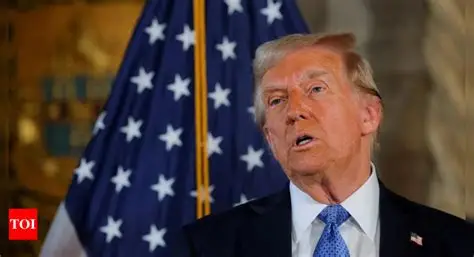President Donald Trump warned Sunday that a government shutdown could occur after Tuesday, September 30, when current federal funding expires. He cited stalled negotiations with congressional Democrats and said a resolution is unlikely before the deadline.
In an interview with CBS News, Trump said Democrats could face political consequences for refusing to agree to further spending cuts. “The Democrats, incredibly, want to keep their old policies of open borders, and we’re not going to allow it,” he said, stressing the need for fiscal restraint.
Democrats insist that any funding agreement must reverse Medicaid cuts, restore public media support, and continue subsidies under the Affordable Care Act. Meanwhile, Republicans, led by House Speaker Mike Johnson, want spending below last year’s levels. This standoff shows deep partisan divisions over federal budgets and domestic programs.
Earlier this month, the Republican-controlled House passed a short-term funding measure to keep the government open through Thursday, November 21, 2025. However, the Senate rejected both GOP and Democratic proposals. Trump plans to meet Monday with top congressional leaders, including Senate Majority Leader Chuck Schumer, Senator John Thune, Speaker Mike Johnson, and House Minority Leader Hakeem Jeffries, for final talks. If they fail to reach an agreement, a shutdown could start at midnight on Tuesday, September 30.
In a notable shift from past practice, the Office of Management and Budget (OMB) told federal agencies to prepare for layoffs in programs that lose funding. Previously, shutdowns resulted in furloughs, with employees returning once funding resumed. Federal workers and union leaders worry this approach signals a more aggressive strategy than before.
Democratic leaders criticized the move. Senate Minority Leader Chuck Schumer called it “an attempt at intimidation.” House Minority Leader Hakeem Jeffries added, “We will not be intimidated by your threat to engage in mass firings.” They stressed that essential government services and employees should not become pawns in political negotiations.
Federal employees face uncertainty as the deadline approaches. Many worry about salaries, benefits, and ongoing programs. Agencies handling healthcare, national security, social services, and disaster response may need to scale back operations. This could affect millions of Americans who rely on federal programs.
Observers note that Trump’s warning and the OMB memo reflect a strategy to pressure Democrats into concessions. They also show that the president wants to demonstrate decisive action to his political base. Analysts warn that this hardline posture may make compromise harder as the deadline nears.
Meanwhile, congressional leaders continue debating possible solutions. Democrats propose targeted spending increases and program restorations. Republicans push for stricter cuts. Negotiations also cover defense funding, social safety nets, and emergency assistance.
Media coverage emphasizes the real-world consequences for federal employees and citizens who depend on government programs. Experts warn that even a short-term shutdown could delay federal contracts, grants, and social benefits. A longer shutdown could create more severe economic effects.
As the nation watches, Trump’s meetings with congressional leaders may determine the outcome. Lawmakers must balance partisan priorities with the need to maintain essential government functions. The president uses public statements and executive guidance to influence negotiations.
The potential shutdown highlights ongoing tensions in Washington over fiscal policy, government priorities, and political power. Federal employees, lawmakers, and the public are closely following developments. The outcome will have immediate effects on government operations and long-term implications for future budget negotiations.



